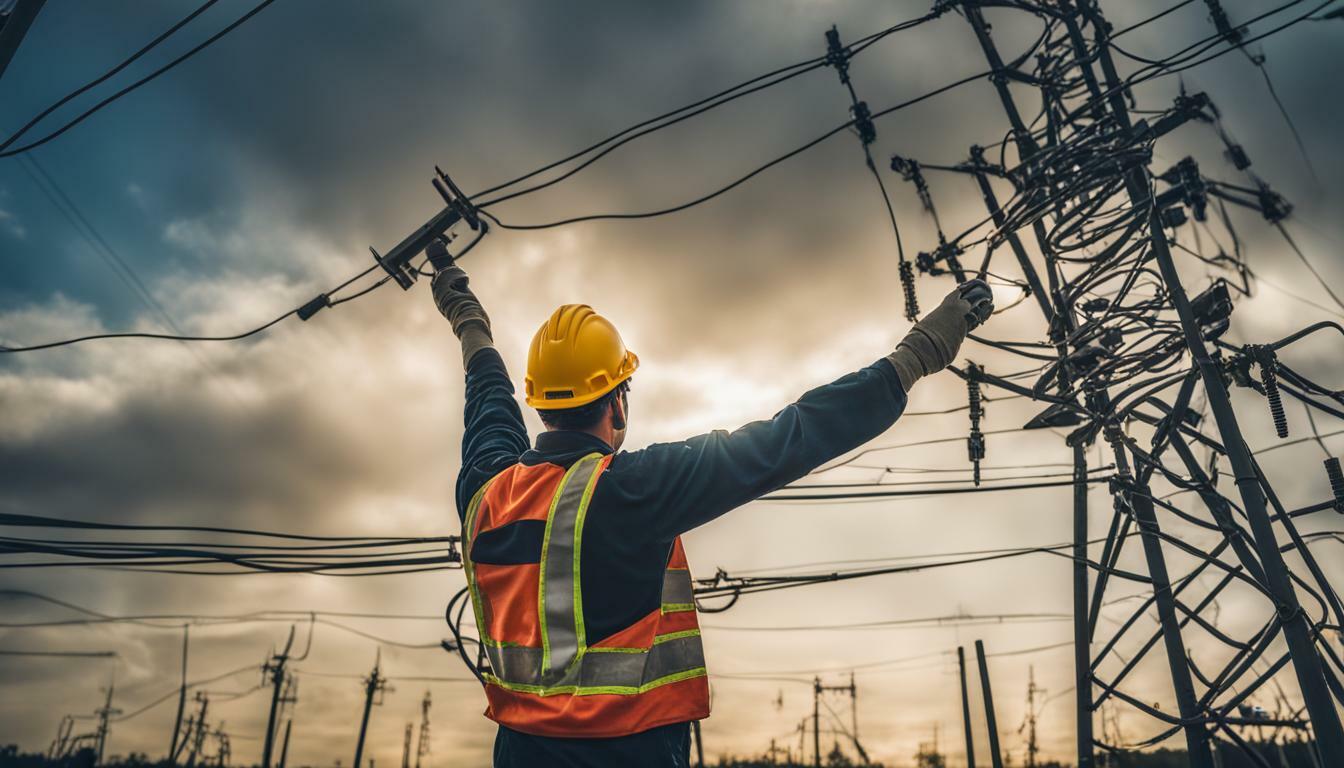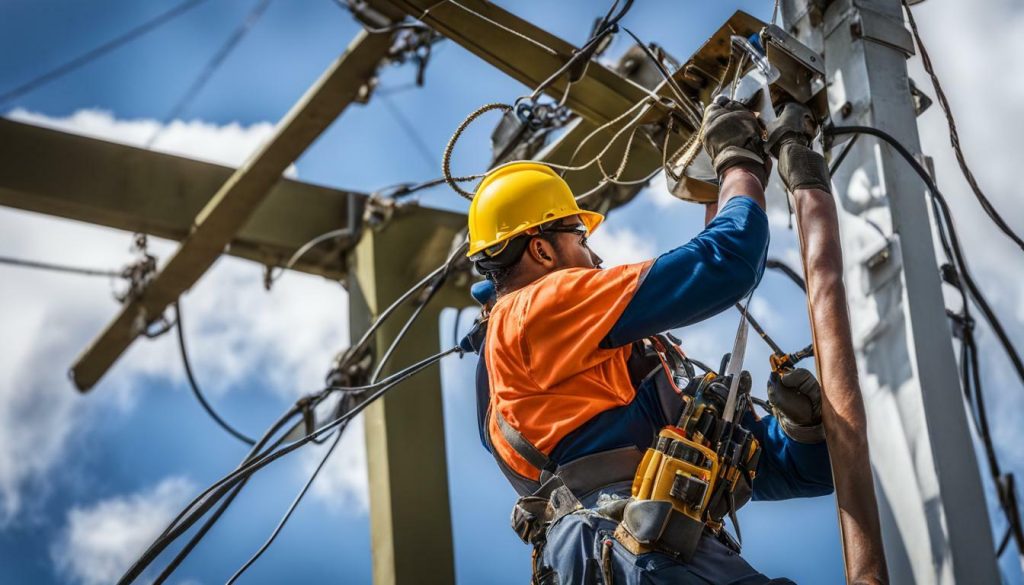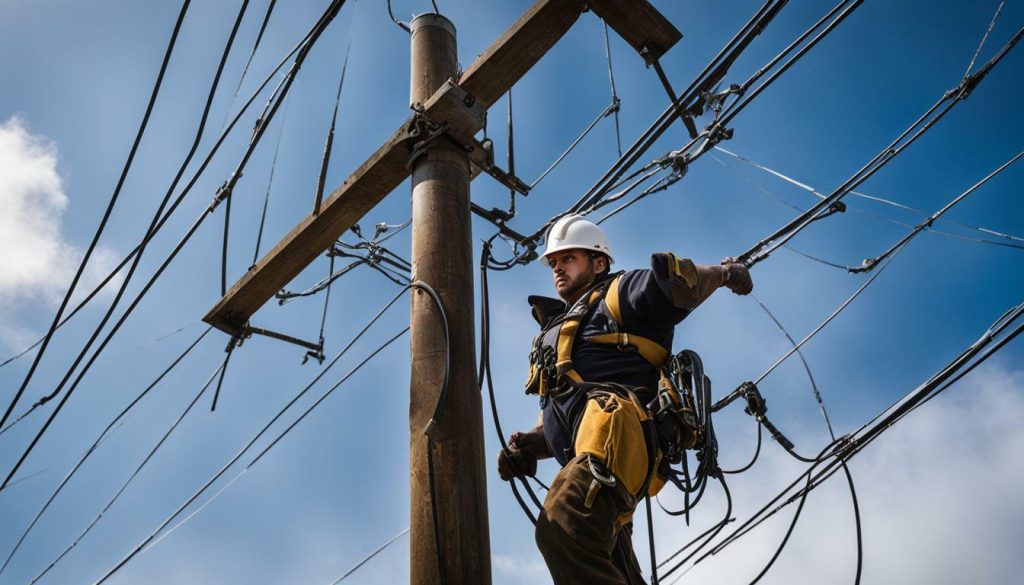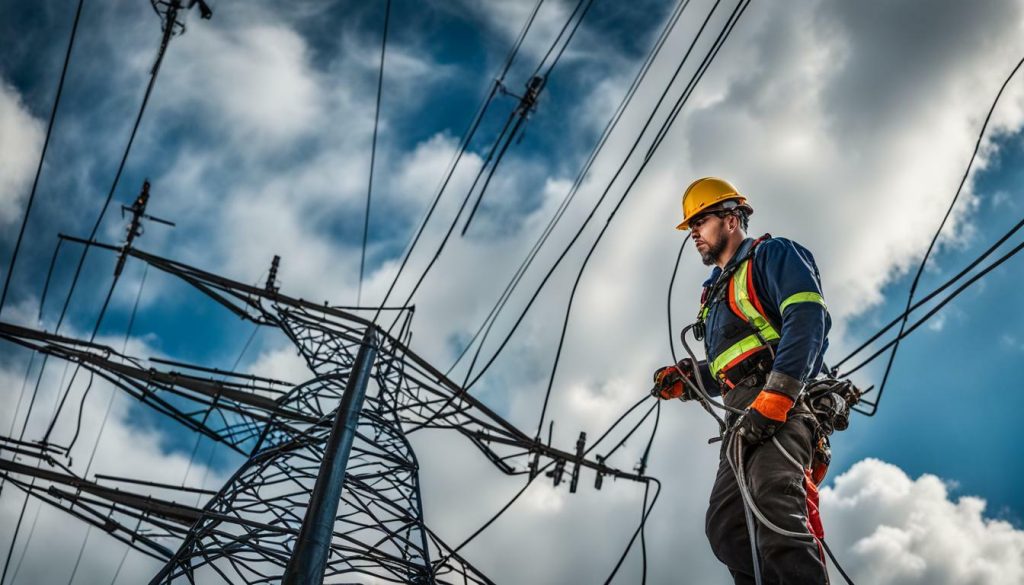
Welcome to Power & Connection – Lineman Skill Training, where we offer comprehensive courses designed to develop the skills of electric utility lineworkers in the areas of power distribution and connection. Our training programs are specifically tailored to enhance career prospects by focusing on power distribution systems and establishing strong connections in the field. We understand the importance of practical training and hands-on experience to ensure our trainees are well-equipped for real-world scenarios.
Key Takeaways:
- Our training programs aim to develop the essential skills of lineworkers in power distribution and connection.
- We provide comprehensive courses that focus on practical training and hands-on experience.
- Our programs align with industry best practices and adapt to changing standards and regulations.
- Over 350 utilities and powerline contractors currently utilize our training material.
- These training programs play a vital role in ensuring safe and efficient operation of power systems.
T&D PowerSkills Program for Lineworkers
The T&D PowerSkills program is at the forefront of lineworker skill development, providing comprehensive training for electric utility lineworkers in the crucial areas of installation, maintenance, and removal of transmission and distribution systems. This program is designed to support lineworker apprenticeship programs and offers a four-year, 8000-hour training program that covers safety-related work practices and technical skills. The training material is broken into short sections that reinforce core principles and adhere to industry best practices, ensuring lineworkers receive the most up-to-date and relevant training.

One of the key strengths of the T&D PowerSkills program is its focus on real-world scenarios and practical skill application. By using a combination of video and workbook-based training, lineworkers are able to learn and practice their skills in a simulated environment before they face them in the field. This hands-on approach not only enhances their ability to perform tasks safely and efficiently but also boosts their confidence and competence.
The program is regularly updated to reflect changing industry standards and regulations, ensuring that lineworkers are equipped with the most current knowledge and skills. Over 350 utilities and powerline contractors currently use the T&D PowerSkills material, further highlighting its relevance and widespread adoption within the industry.
Reinforcing Industry Best Practices
One of the outstanding features of the T&D PowerSkills program is its emphasis on industry best practices. The program covers a wide range of technical skills specific to the installation, maintenance, and removal of transmission and distribution systems. These skills are crucial to ensure the safe and efficient operation of electrical power systems.
| Skills Covered in the T&D PowerSkills Program: |
|---|
| Safety-related work practices |
| Installation, maintenance, and removal of transmission and distribution systems |
| Use of specialized tools and equipment |
| Emergency response procedures |
By following industry best practices, lineworkers can ensure that power systems are operated safely and efficiently, minimizing the risk of accidents and improving overall reliability. The T&D PowerSkills program plays a vital role in equipping lineworkers with the necessary skills and knowledge to meet the demands of their challenging profession.
Lineman Training Courses by TVPPA
TVPPA’s Lineman Training courses provide lineworkers with a wide range of essential knowledge and skills, covering topics such as basic math, electricity, and the use of tools and equipment in their daily operations. These courses are designed to equip lineworkers with the necessary expertise to excel in their roles, ensuring the safe and efficient operation of power systems. With a strong emphasis on practical training and hands-on experience, lineworkers gain valuable skills that enable them to tackle the challenges of the job with confidence.
The training courses offered by TVPPA cover a comprehensive curriculum that includes various aspects of linework, including underground distribution systems, transmission and distribution line maintenance, and more. Lineworkers are exposed to the latest industry best practices and standards, ensuring they are up-to-date with the ever-changing landscape of the power industry.
These courses incorporate laboratory sessions, workshops, and final exams to ensure a well-rounded understanding of the material. Lineworkers have the opportunity to apply their knowledge in real-world scenarios, further enhancing their competency and skill set.
Sample Table – Course Topics
| Course | Topics Covered |
|---|---|
| Basic Math for Lineworkers | Mathematical concepts and calculations relevant to linework |
| Electricity Principles | Understanding electrical circuits, Ohm’s law, and electrical safety |
| Tools and Equipment in Linework | Identification, proper usage, and maintenance of linework tools and equipment |
| Underground Distribution Systems | Installation, maintenance, and troubleshooting of underground distribution components |
By completing these Lineman Training courses, lineworkers can enhance their skill set, improve their career prospects, and make a significant contribution to the field of power and connection. The TVPPA’s commitment to providing high-quality training ensures that lineworkers are equipped with the knowledge and expertise needed to excel in their roles.

“These training programs and courses play a vital role in equipping lineworkers with the necessary skills and knowledge to ensure the safe and efficient operation of power systems.”
Assessment Workshop for Lineworker Apprentices
The assessment workshop conducted by TVPPA plays a crucial role in identifying potential lineworker apprentices by evaluating their aptitude for various aspects of line work, particularly climbing, and providing a comprehensive written assessment of their capabilities. This workshop serves as an important step in the selection process, ensuring that only the most competent and suitable candidates are chosen for the demanding role of a Lineworker Apprentice.
During the workshop, candidates are put through a series of practical tests and examinations to assess their physical fitness, technical knowledge, problem-solving skills, and ability to work under pressure. Emphasis is placed on evaluating their climbing ability, as this is a fundamental skill required in many aspects of line work.
The written assessment component of the workshop further examines the candidates’ potential to perform line work under stress, capacity to learn, and ability to follow orders. This comprehensive evaluation provides valuable insights into their suitability for the role of a Lineworker Apprentice.
The TVPPA assessment workshop is designed to be rigorous yet fair, ensuring that only the most capable individuals are selected for lineworker apprenticeship programs. By setting high standards and evaluating candidates against industry best practices, the workshop plays a crucial role in maintaining the quality and expertise of lineworkers in the electric utility industry.

| Assessment Area | Description |
|---|---|
| Physical Fitness | Evaluates candidates’ overall strength, agility, and endurance. |
| Technical Knowledge | Assesses candidates’ understanding of electrical systems, safety procedures, and industry regulations. |
| Problem-Solving Skills | Tests candidates’ ability to analyze and find solutions to complex technical challenges. |
| Climbing Ability | Examines candidates’ proficiency in climbing poles and structures using approved techniques. |
| Written Assessment | Evaluates candidates’ comprehension, communication skills, and ability to follow instructions. |
Supportive Role of Training Programs
Training programs, such as Power & Connection – Lineman Skill Training and TVPPA’s Lineman Training courses, play a vital role in equipping lineworkers with the essential skills and knowledge required to ensure the safe and efficient operation of power systems. These programs provide comprehensive training that covers a wide range of topics, from basic math and electricity principles to the use of tools and equipment in everyday operations. By offering hands-on laboratory sessions, workshops, and final exams, lineworkers are able to gain a comprehensive understanding of the material and develop the necessary skills to excel in their roles.
One of the key benefits of these training programs is their alignment with industry best practices. The material is regularly updated to reflect changing standards and regulations, ensuring that lineworkers are well-prepared to handle the evolving demands of their profession. This commitment to staying current in the industry sets these programs apart and gives lineworkers a competitive edge in their careers.
Moreover, these training programs are widely recognized and adopted by over 350 utilities and powerline contractors. This widespread use speaks to the credibility and effectiveness of the training material offered. Lineworkers who have completed these programs are highly sought after by employers due to their extensive knowledge and practical experience.

Overall, the supportive role of training programs cannot be underestimated. They provide lineworkers with the skills, knowledge, and practical experience necessary to ensure the safe and efficient operation of power systems. By investing in these programs, lineworkers are able to enhance their career prospects and contribute to the reliable delivery of electricity to communities.
Relevance of Practical and Hands-On Training
Practical and hands-on training forms a crucial part of lineman skill development, allowing lineworkers to apply their skills in real-world scenarios and gain the confidence and competence necessary for their roles. It goes beyond theoretical knowledge and provides an immersive learning experience that fosters practical skill application.
By engaging in practical training exercises, lineworkers have the opportunity to work with the tools, equipment, and materials they will encounter in their daily tasks. This hands-on experience allows them to become familiar with the intricacies of their craft, enabling them to troubleshoot and solve problems effectively in real-time situations.
One of the key benefits of practical training is that it enables lineworkers to learn how to apply their skills in a controlled environment before they face the challenges of the field. Through simulated scenarios, they can practice techniques, develop muscle memory, and refine their abilities. This proactive approach not only enhances their performance but also promotes safety, as lineworkers are better equipped to handle potential risks and hazards.

In addition, the hands-on nature of training allows lineworkers to gain confidence in their abilities. As they successfully complete tasks and overcome obstacles, their self-assurance grows, empowering them to tackle more complex projects with ease. This confidence translates into a higher level of efficiency and productivity, contributing to the overall success of power system operations.
Overall, practical and hands-on training plays an essential role in developing the skills and capabilities of lineworkers. It provides them with the necessary experience to face real-world challenges, ensuring that power distribution and connection tasks are carried out safely and efficiently. Through this immersive learning approach, lineworkers are well-prepared to handle the demands of their roles and contribute to the reliable functioning of power systems.
Table: Benefits of Practical and Hands-On Training
| Benefits | Description |
|---|---|
| Enhanced skill application | Allows lineworkers to practice and refine their skills in realistic scenarios. |
| Improved problem-solving abilities | Enables lineworkers to troubleshoot and find solutions to challenges encountered in the field. |
| Promotion of safety | Equips lineworkers with the knowledge and experience to identify and mitigate potential risks. |
| Boosted confidence | Empowers lineworkers to approach tasks with self-assuredness and achieve higher levels of productivity. |
Overall Impact of Lineman Skill Development Programs
Lineman skill development programs have a significant impact on career advancement, aligning lineworkers with industry standards and gaining recognition from utilities and powerline contractors for their enhanced skills. One such program, the T&D PowerSkills program, offers comprehensive video and workbook-based training for electric utility lineworkers, covering safety-related work practices and technical skills related to power distribution. With its focus on practical and hands-on training, the program equips lineworkers with the knowledge and expertise needed for powerline work.
The T&D PowerSkills program is designed to support lineworker apprenticeship programs and can be used as a four-year, 8000-hour training program. It breaks down the training material into short sections, reinforcing core principles and adhering to industry best practices. Regular updates ensure that the program reflects the latest industry standards and regulations. Currently, over 350 utilities and powerline contractors utilize the T&D PowerSkills material, recognizing its effectiveness in enhancing lineworker skills.
In addition to the T&D PowerSkills program, lineworkers can also benefit from the Lineman Training courses offered by TVPPA. These courses cover a wide range of topics, including basic math, electricity, tools and equipment, and underground distribution systems. Through laboratory sessions, workshops, and final exams, lineworkers gain a comprehensive understanding of the material and develop the skills needed for their daily operations. The TVPPA also offers an assessment workshop to evaluate candidates’ suitability for the demanding role of Lineworker Apprentice, ensuring that only the most capable individuals are selected.
Overall, these lineman skill development programs play a vital role in equipping lineworkers with the necessary skills and knowledge to ensure the safe and efficient operation of power systems. By investing in training and development, lineworkers enhance their career prospects and contribute to the industry as a whole. With their newfound skills, lineworkers gain recognition from utilities and powerline contractors, who value their expertise and commitment to excellence.
FAQ
What is the Power & Connection – Lineman Skill Training program?
The Power & Connection – Lineman Skill Training program is a comprehensive video and workbook-based training program for electric utility lineworkers. It focuses on safety-related work practices and technical skills related to the installation, maintenance, and removal of transmission and distribution systems.
How long is the Power & Connection – Lineman Skill Training program?
The Power & Connection – Lineman Skill Training program can be used as a four-year, 8000-hour training program. It is designed to support lineworker apprenticeship programs.
How often is the T&D PowerSkills program updated?
The T&D PowerSkills program is regularly updated to ensure it reflects changing industry standards and regulations.
How many utilities and powerline contractors use the T&D PowerSkills material?
Currently, over 350 utilities and powerline contractors use the T&D PowerSkills material.
What topics are covered in the Lineman Training courses offered by TVPPA?
The Lineman Training courses offered by TVPPA cover topics such as basic math, electricity, alternating current principles, tools and equipment used in everyday operations, stringing and sagging wire, underground distribution systems, transmission and distribution line maintenance, and more.
What does the assessment workshop for Lineworker Apprentices evaluate?
The assessment workshop for Lineworker Apprentices evaluates candidates’ ability to learn various aspects of line work, especially climbing. It provides a written assessment of their potential to perform line work under stress, capacity to learn, and ability to follow orders.
How do training programs and courses support lineworkers?
Training programs and courses play a vital role in equipping lineworkers with the necessary skills and knowledge to ensure the safe and efficient operation of power systems.



